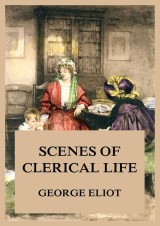Details

Scenes of Clerical Life
|
0,99 € |
|
| Verlag: | Jazzybee Verlag |
| Format: | EPUB |
| Veröffentl.: | 16.11.2017 |
| ISBN/EAN: | 9783849650490 |
| Sprache: | englisch |
| Anzahl Seiten: | 476 |
Dieses eBook enthält ein Wasserzeichen.
Beschreibungen
The first of the three stories, 'The Sad Fortunes of the Reverend Amos Barton,' is the slightest and simplest. Mr. Barton, a curate, with an income of eighty pounds a-year, with an angelic but sickly wife and a host of hungry little children, allows himself to be duped by the title of a 'Countess Czerlaski,' the handsome English widow of a Polish dancing-master. The countess quarrels with her brother, Mr. Bridmain, and throws herself on the hospitality of the Bartons. Her visit lasts beyond all reasonable time, the unfortunate couple are eaten up by the expense of providing for her, Mr. Barton's character is aspersed on account of his kindness to her, and Mrs. Barton dies of working for her. Mr. Barton loses his curacy, goes into another neighbourhood, and, after many years, revisits his wife's grave in company with his children. The next story tells how the Rev. Maynard Gilfil loved Tina Sarti, an Italian orphan, who had been brought to England by Sir Christopher and Lady Cheverel, and lived under their shadow in a dignified country house. Tina, however, had fixed her affections on Sir Christopher's nephew, Captain Wybrow; and when the captain pays court to a beautiful, rich, and lofty heiress, the little Italian girl is so exasperated by his conduct, that she resolves to stab him at an appointed interview. She is happily spared this crime, as, on reaching the place of meeting, she finds the faithless captain dead from a sudden attack of heart-disease ...
Novelist, was b. near Nuneaton, Warwickshire, dau. of Robert E., land agent, a man of strong individuality. Her education was completed at a school in Coventry, and after the death of her mother in 1836, and the marriage of her elder sister, she kept house for her f. until his death in 1849. In 1841 they gave up their house in the country, and went to live in Coventry. Here she made the acquaintance of Charles Bray, a writer on phrenology, and his brother-in-law Charles Hennell, a rationalistic writer on the origin of Christianity, whose influence led her to renounce the evangelical views in which she had been brought up. In 1846 she engaged in her first literary work, the completion of a translation begun by Mrs. Hennell of Strauss's Life of Jesus. On her f.'s death she went abroad with the Brays, and, on her return in 1850, began to write for the Westminster Review, of which from 1851-53 she was assistant-editor. In this capacity she was much thrown intopage 132 the society of Herbert Spencer and George Henry Lewes (q.v.), with the latter of whom she in 1854 entered into an irregular connection which lasted until his death. In the same year she translated Feuerbach's Essence of Christianity, the only one of her writings to which she attached her real name. It was not until she was nearly 40 that she appears to have discovered the true nature of her genius; for it was not until 1857 that The Sad Fortunes of the Rev. Amos Barton appeared in Blackwood's Magazine, and announced that a new writer of singular power had arisen. It was followed by Mr. Gilfil's Love Story and Janet's Repentance, all three being reprinted as Scenes from Clerical Life (1857); Adam Bede was pub. in 1859, The Mill on the Floss, in its earlier chapters largely autobiographical, in 1860, Silas Marner, perhaps the most artistically constructed of her books, in 1861. In 1860 and 1861 she visited Florence with the view of preparing herself for her next work, Romola, a tale of the times of Savonarola, which appeared in 1863 in the Cornhill Magazine. Felix Holt the Radical followed in 1866. Miss E. now for a time abandoned novel-writing and took to poetry, and between 1868 and 1871 produced The Spanish Gipsy, Agatha, The Legend of Jubal, and Armgart. These poems, though containing much fine work, did not add to her reputation, and in fact in writing them she had departed from her true vocation. Accordingly, she returned to fiction, and in Middlemarch, which appeared in parts in 1871-72, she was by many considered to have produced her greatest work. Daniel Deronda, which came out in 1874-76, was greatly inferior, and it was her last novel. In 1878 she pub. The Impressions of Theophrastus Such, a collection of miscellaneous essays. In the same year Mr. Lewes d., an event which plunged her into melancholy, which was, however, alleviated by the kindness of Mr. John Cross, who had been the intimate friend of both L. and herself, and whom she m. in March, 1880. The union was a short one, being terminated by her death on December 22 in the same year.

















